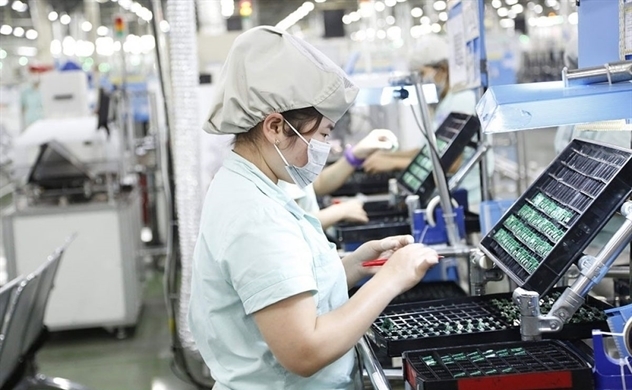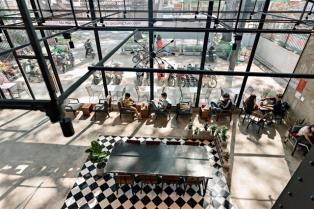Viet Nam attracted US$12.33 billion worth of foreign direct investment in the first four months of 2020, a year-on-year decrease of 15.5 per cent due to the impact of the COVID-19 pandemic, according to the Foreign Investment Agency.

Viet Nam attracted US$12.33 billion worth of foreign direct investment in the first four months of 2020, a year-on-year decrease of 15.5 per cent due to the impact of the COVID-19 pandemic, according to the Foreign Investment Agency.
But the figure was much higher than that in the same period in 2018 and 2017, when FDI was only $5.8 billion and $9.2 billion, it said.
The four-month period saw 984 new foreign projects licensed with a total capital of $6.78 billion, down 9.1 per cent in terms of number of projects but up 26.9 per cent in value.
Many experts said, however, the country’s FDI flows had shown some signs of a “break-out”.
Viet Nam’s successful control of the pandemic has been one of the main reasons for attracting foreign investors, according to the experts.
Many of them are possibly those fleeing China due to rising labour costs and the US-China trade war, which is being escalated due to the pandemic.
But Viet Nam has in recent years seen the arrival of many foreign manufacturers from China, including many Chinese.
For instance, in 2018 Korean giant Samsung and Japan’s Olympus closed their factories in Shenzhen in southern China and moved bag and baggage to Viet Nam.
The former has already invested billions of dollars in building a grand manufacturing base in the Sai Gon High-tech Park in HCM City. The park has also attracted huge investments from other high-profile tech giants like Intel, Schneider and Jabil.
Earlier, in 2015, Microsoft had moved its Nokia manufacturing from Bejing to Ha Noi.
Now, amid the escalating US-China trade war and the Covid-19 pandemic, the US wants to bring high-tech manufacturing back home. To do this, it will have to revamp global supply chains.
Besides, multinationals have been moving from China to other countries to avoid the higher costs due to the US tariffs on Chinese exports.
Viet Nam is among the countries they are moving to.
Besides low labour costs, the country also has other advantages that help it attract global firms, including a young population, a supportive policy environment and sustainable economic growth.
Nguyen Dinh Cung, member of the Economics Advisory Group to the Prime Minister, also pointed out another important reason for global firms’ switch to Viet Nam: They want to diversify supply chains to reduce reliance on a few markets.
What should Viet Nam do?
Analysts said when the US-China Trade War broke out, Viet Nam was expected to become a new regional manufacturing hub since many global companies seemed interested, but things have panned out otherwise.
Markets that create good financial efficiency for investors and enable low costs attract foreign investors, according to the analysts.
Viet Nam has yet to meet these conditions and if it wants to attract foreign supply chains it would have to do so and more.
They stressed the need for the country to soon restructure its economy to improve its competitiveness.
It would also need to have an industrialisation programme for 2021-30 to enable its firms to enter global supply chains.
Tran Toan Thang of the Ministry of Planning and Investment said it was very important for a country to attract foreign investors, but keeping them, especially large firms, is much more important.
Incentives like tax and land rent waivers and low labour costs could attract them at first, but these would not be enough to keep them, he said.
To keep them would require a country to have an open and transparent business environment, a modern and well-linked transport system and a comprehensive and reliable legal system that is in line with international rules.
"High-quality human resources, a large domestic market with a growing middle class and supply of supporting industries for foreign businesses are also imperative," he said.
Retail investors keep corporate bonds going
According to a recent report by the Ministry of Finance, corporate bond issuance increased sharply in April to VND30.12 trillion (nearly $1.4 billion).
The figure for the entire first quarter was only VND35.55 trillion ($1.54 billion).
A highlight has been the increased buying by individual investors, not only in April but also earlier, the report says.
In the first quarter their buying doubled year-on-year to 20 per cent.
They bought more than VND9.5 trillion ($404.9 million) worth, with domestic investors accounting for almost the entire amount.
Analysts attributed the interest to the increasing coupon rates for many of the bonds and a simultaneous decrease in bank deposit interest rates at a time when all other asset classes were hit by the effects of the COVID-19 pandemic.
According to SSI Securities Corporation, in the first quarter of the year the interest rate on corporate bonds averaged 10.4 per cent, 1.57 percentage points higher than the average rate.
In March the State Bank of Viet Nam (SBV) decided to cut many key interest rates in an attempt to support the economy, which was hurt by the outbreak.
The refinancing rate was cut by 1 percentage point to 5 per cent, and the discount rate by half a percentage point to 3.5 per cent.
The overnight lending rate in the inter-bank market was also adjusted down to 6 per cent from 7 per cent, and the open-market-operation (OMO) rate, to 3.5 per cent from 4 per cent.
The central bank also reduced the cap on the interest rates on dong deposits and loans by 0.25-0.5 percentage points, depending on the tenor.
After the central bank’s moves, many banks cut their deposit interest rates significantly even as credit growth slowed down sharply.
Private banks such as VPBank, MBBank, ACB, and Viet Capital Bank reduced their interest rates by 0.2-0.7 percentage points.
At VP Bank, the interest rate on six-month deposits stands at 6.6 per cent now and on 12-month deposits, ranking from 6.7 to 7.2 per cent per year.
Vietcombank, the largest State-owned lender by market cap, lowered its deposit interest rates by 0.2-0.3 percentage points for periods of six months and more.
The cuts came amid bank credit growth in the first quarter of only 1.1 per cent compared to 2.28 per cent in the same period last year as many businesses scaled down or stopped operations, experts said.
Bao Viet Securities Company said the corporate bonds were expected to continue attracting individual investors since their interest rates were quite high and bank deposit interest rates were expected to fall further since the central bank planned to further cut key interest rates in the coming months.
Property companies like Phu Hung Real Estate Investment JSC, Paradise Bay Resort Company Limited and Hai Phat Investment JSC offered coupon rates of 11-13 per cent.
TPBank and MB Securities made issuances at 8.5-9.5 per cent.
The Ha Noi Stock Exchange said in fact retail investors were keeping the corporate bond market afloat.
But experts warn the retail investors about the possible risks, saying they should not buy corporate bonds just for high interest rates without paying attention to their potential and the possible risks. — VNS





